Beyond the Headlines
Air Date: Week of July 17, 2020
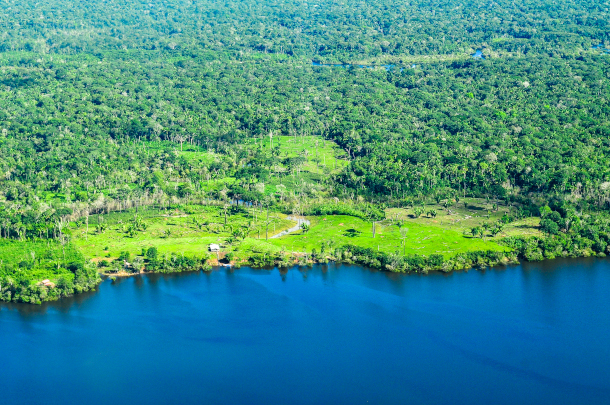
The Amazon rainforest has long been endangered by logging and extraction, but now the Indigenous people who live there are being exposed to coronavirus as well. (Photo: Neil Palmer, CIAT, Flickr, CC BY-NC-ND 2.0)
This week, Environmental Health News editor Peter Dykstra and Bobby Bascomb go Beyond the Headlines to talk about how resource extraction is impacting Indigenous communities from the Amazon rainforest to the Sámi in Finland. And in the history calendar, Peter and Bobby remember two Brazilian environmental activists who were murdered in retaliation for their efforts to protect the Amazon rainforest.
Transcript
BASCOMB: It's time for a trip now beyond the headlines with Peter Dykstra. Peter is an editor with Environmental Health News that's EHN.org and dailyclimate.org. Hey there, Peter, what do you have for us this week?
DYKSTRA: Hi, Bobby. There's great concern that as loggers make inroads into the Amazon as it's converted into ranches and farms, and even as religious missionaries make their way deeper and deeper into the Amazon, that one of the things that's going to hit you right along is COVID-19. And these tribes have little defense against the incursion, let alone little defense against the disease. And it could be that President Bolsanaro, has looked for any opportunity to make further inroads into the Amazon, even at the expense of its native inhabitants.
BASCOMB: I imagine that's very, very frustrating for the environmental groups that work with the native people there. I mean, Brazil has a wonderful constitution that really strongly protects their rights to the land and their rights to live their life as they want, but that's not being respected these days.
DYKSTRA: You and your constitution, Bobby. You know, it's so within authoritarian government and the threats on a number of different fronts, including disease are making a bad situation even worse for the Indigenous residents of the Amazon.
BASCOMB: Mmm Indeed. Well, what else do you have for us this week?
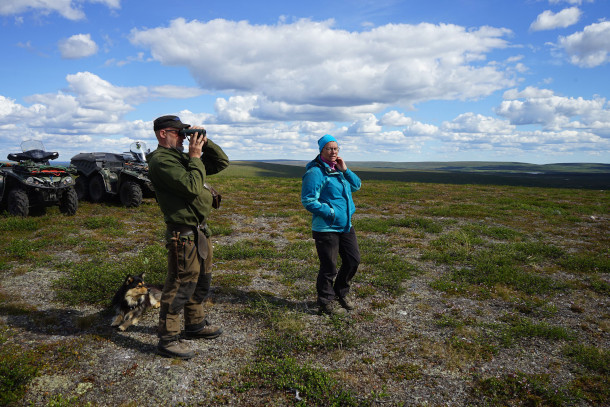
Sámi Natives observing drilling rigs taking core samples of precious metals. The Sámi people live in Finland’s northwestern Plains and have herded reindeer since ancient times. (Photo: Courtesy of Thomas Nielsen)
DYKSTRA: In a very different part of the world there's an Indigenous population in Europe in Northern Finland also in Sweden and Norway. The Sami people are as dependent on herding reindeer as the Plains Indians were in North America on the bison. They're the center of their culture, their food and reindeer herding for the Sami is under threat because their land includes precious metals needed for get this electric vehicle batteries.
BASCOMB: Oh, the irony. What are they finding there that's so attractive?
DYKSTRA: Metals like nickel, copper, vanadium, cobalt, all used in large supply in car batteries, particularly the larger ones that are going to be needed to drive EVs are found there. Europe wants its own supply of these metals. Finland wants to ride this potential economic wave to become the equivalent of an oil state only in precious metals. The Sami people have very, very little recourse to protect their land and culture.
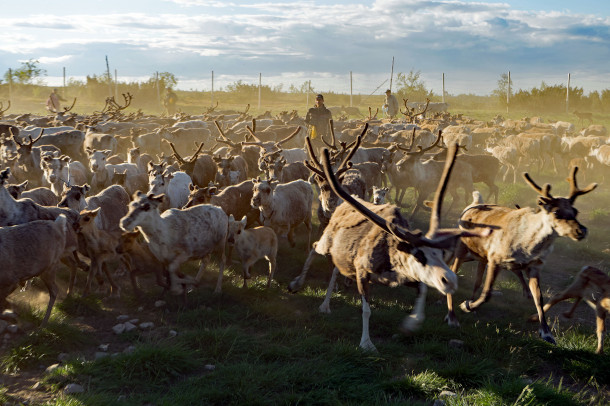
The livelihood of the Sámi people will likely be threatened by mining extraction of minerals for electric vehicles. Currently there is little protection for the Sámi people, but if Finland ratifies the ILO Convention on the Rights of Indigenous People, they might have more control over their traditional homeland. (Photo: Courtesy of Thomas Nielsen)
BASCOMB: You compare the reindeer to the bison of the North American plains and the native people here were also pushed off their land when something valuable was found beneath it, you know, be a gold oil, minerals. Seems, it seems like a familiar story.
DYKSTRA: It is although I would like to think that we would have progressed at least a little in the past 150 years.
BASCOMB: That would be nice.
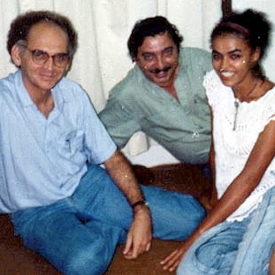
Brazilian environmental activist Chico Mendes (center), alongside Gregorío (left) and Marina Silva (right). (Photo: Marina Silva, Flickr, CC BY 2.O)
BASCOMB: Well, what do you have for us from the history books this week?
DYKSTRA: July 21, 1980 40 years ago. The head of the Brazilian rubber tappers union, Wilson Pinheiro was murdered in his home Pinheiro had become an adversary to the ranchers, loggers, farmers, who are making inroads in the Amazon. His murder proceeded that of Chico Mendez. Both of their lives particularly Mendez, were featured in a book called The Burning Season, a TV movie by the same name starring the late Raul Julia. And that book and movie the book by journalist, Andy Revkin helped for the first time show the plight of rubber tappers and native Amazonians up against the deforestation of the world's greatest forest.
BASCOMB: Well, thank you, Peter. Peter Dykstra is an editor with Environmental Health News that's EHN.org and dailyclimate.org. And we'll talk to you again real soon.
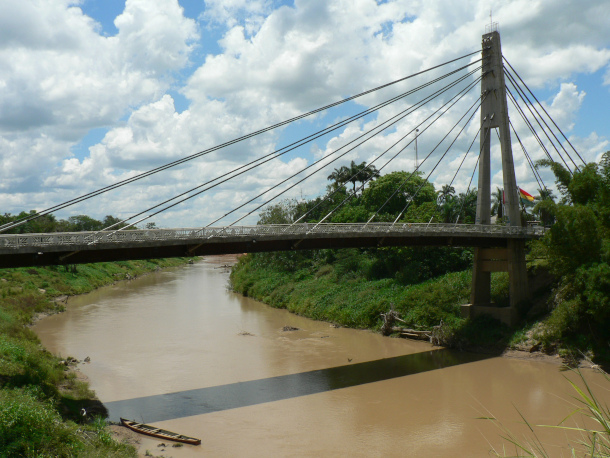
Picture of the binational bridge between Brazil and Bolivia, dedicated to environmental activist Wilson Pinheiro. (Photo: Grullab, Wikimedia Commons, CC BY SA 3.0)
DYKSTRA: Okay, Bobby, thanks a lot. Talk to you soon.
BASCOMB: And there's more on these stories on the living on earth website. That's LOE dot ORG.
Links
Learn More About Environmental Activists Wilson Pinheiro and Chico Mendes
Living on Earth wants to hear from you!
Living on Earth
62 Calef Highway, Suite 212
Lee, NH 03861
Telephone: 617-287-4121
E-mail: comments@loe.org
Newsletter [Click here]
Donate to Living on Earth!
Living on Earth is an independent media program and relies entirely on contributions from listeners and institutions supporting public service. Please donate now to preserve an independent environmental voice.
NewsletterLiving on Earth offers a weekly delivery of the show's rundown to your mailbox. Sign up for our newsletter today!
 Sailors For The Sea: Be the change you want to sea.
Sailors For The Sea: Be the change you want to sea.
 The Grantham Foundation for the Protection of the Environment: Committed to protecting and improving the health of the global environment.
The Grantham Foundation for the Protection of the Environment: Committed to protecting and improving the health of the global environment.
 Contribute to Living on Earth and receive, as our gift to you, an archival print of one of Mark Seth Lender's extraordinary wildlife photographs. Follow the link to see Mark's current collection of photographs.
Contribute to Living on Earth and receive, as our gift to you, an archival print of one of Mark Seth Lender's extraordinary wildlife photographs. Follow the link to see Mark's current collection of photographs.
 Buy a signed copy of Mark Seth Lender's book Smeagull the Seagull & support Living on Earth
Buy a signed copy of Mark Seth Lender's book Smeagull the Seagull & support Living on Earth

